 Budget Plan for 2006-07
Budget Plan for 2006-07Revenue Plan
Mr. Speaker, the contribution of the oil industry to the
provincial economy and treasury has changed dramatically over
the past five years. The oil sector now contributes
approximately 16 per cent to provincial GDP and about 18 per
cent to provincial revenues. This compares to a contribution in
2002-03 of 7.8 per cent to GDP and 3 per cent to revenues.
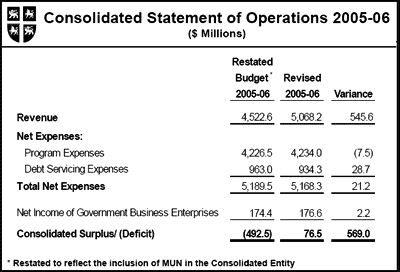
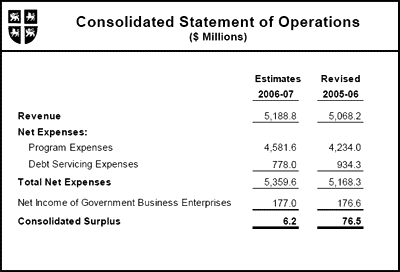
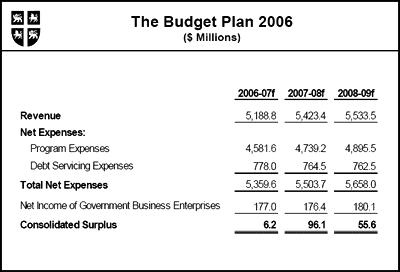
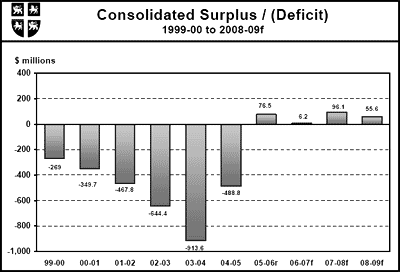
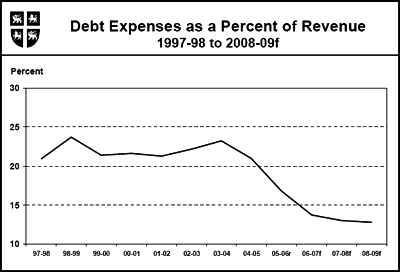
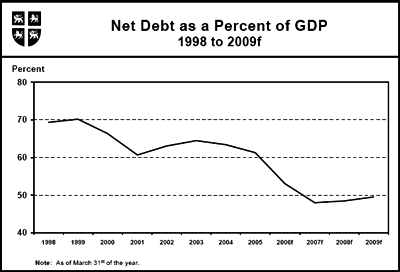
In 2006-07, the province is expecting to generate royalties
from oil production of $703 million and corporate income tax
from companies operating in the offshore area of $224 million.
This represents direct revenue from offshore oil of $927 million
in this year alone. This forecast assumes the average price per
barrel of oil will be $US57. Added to this is the benefit
accruing to the people of the province from the Atlantic Accord
arrangements which will contribute an additional $329 million in
2006-07.
As a benefit of our actions and successes of the past year, we
are now in a position to announce that there are no new taxes
and, with one exception, no tax rate increases in this year�s
budget.
Our primary reason for implementing this solitary tax increase
is not to raise new revenue, but to further discourage our
people from smoking, particularly our province�s young people,
whose spending decisions tend to be more price-sensitive.
Effective a minute after midnight tonight, we will raise the tax
rate by one cent per cigarette and by five cents per gram of
fine-cut tobacco.
A critical element of a competitive economy is its taxation
regime. This province has been forced to impose a tax burden on
its residents that is high in relation to other jurisdictions.
Over the coming fiscal year, our government will undertake a
review of the province�s overall tax structure. The government
will also give consideration to whether it will mirror federal
changes to the dividend tax credit, once details are released by
the federal government. This will be done in conjunction with a
review of the potential impacts of income trusts on corporate
income tax.
Expenditure Plan
Mr. Speaker, we are delighted that, as a result of hard work
over the past two years, we are no longer in the position of
requiring significant additional revenues from Newfoundlanders
and Labradorians. But having made significant fiscal progress
and having secured significant new revenues through the Atlantic
Accord and other initiatives, we would be fooling ourselves and
undermining our future if we were to lose sight now of the
purpose for which we sought fiscal stability in the first place.
Newfoundland and Labrador continues to carry a heavy burden of
net debt � in total, about $12 billion � more than $23,000 for
every person in our province, from the oldest to the very
youngest. Servicing that debt each year draws hundreds of
millions of dollars away from the resources we might otherwise
use to strengthen our social programs and grow our economy. The
government is obligated to cover liabilities in various pension
plans which previous administrations over the years raided to
cover their other expenses. We are the future generations that
have inherited the consequences of those decisions. We will not
burden our grandchildren with the consequences of our own. But
we also recognize that there is more to growing an economy than
simply reducing the debt. Newfoundland and Labrador also has a
significant infrastructure deficit caused by years of neglect of
our roads, ferries, hospitals, schools and other public
buildings. Reliable infrastructure is essential to attract
investment, capitalize on opportunity and stimulate sustainable
economic activity. No less essential for economic sustainability
are strategic initiatives that will harness our resources,
diversify our economy, educate our people and reduce the
barriers to growth and success. It is only by striking an
optimal balance and continuing to lay the foundation for
economic growth that we will move beyond the downward spirals of
the past and fuel the momentum that is advancing us toward a
sustainable future.
So with our goal of a strong and self-reliant Newfoundland and
Labrador clearly in view, we are moving ahead this year to
strike the perfect balance that marries fiscal stability with
strategic economic investment. Firstly, we are investing
responsibly in reducing our exposure to debt by applying a
significant portion of the Atlantic Accord revenue against our
pension plan liabilities � liabilities that we would otherwise
have to borrow significantly to cover when they come due. This
investment will actually free up money we would otherwise need
to allocate toward debt servicing. To reinforce our commitment
to fiscal prudence, our government will also move to bring
balanced budget legislation forward for consideration by this
House before the end of this mandate. The days of passing a debt
burden on to our children and grandchildren must end. Secondly,
we will invest strategically in a bold range of measures to
strengthen our education system, unleash an innovation
revolution, bolster our public infrastructure, diversify our
rural economies, empower Labrador, invigorate our cultural
industries, reduce poverty, secure our communities and enhance
our public health care system for the long-term benefit of all
Newfoundlanders and Labradorians. This is the perfect balance.
These are the right choices to sustain momentum for growth and
prosperity in Newfoundland and Labrador.
|
